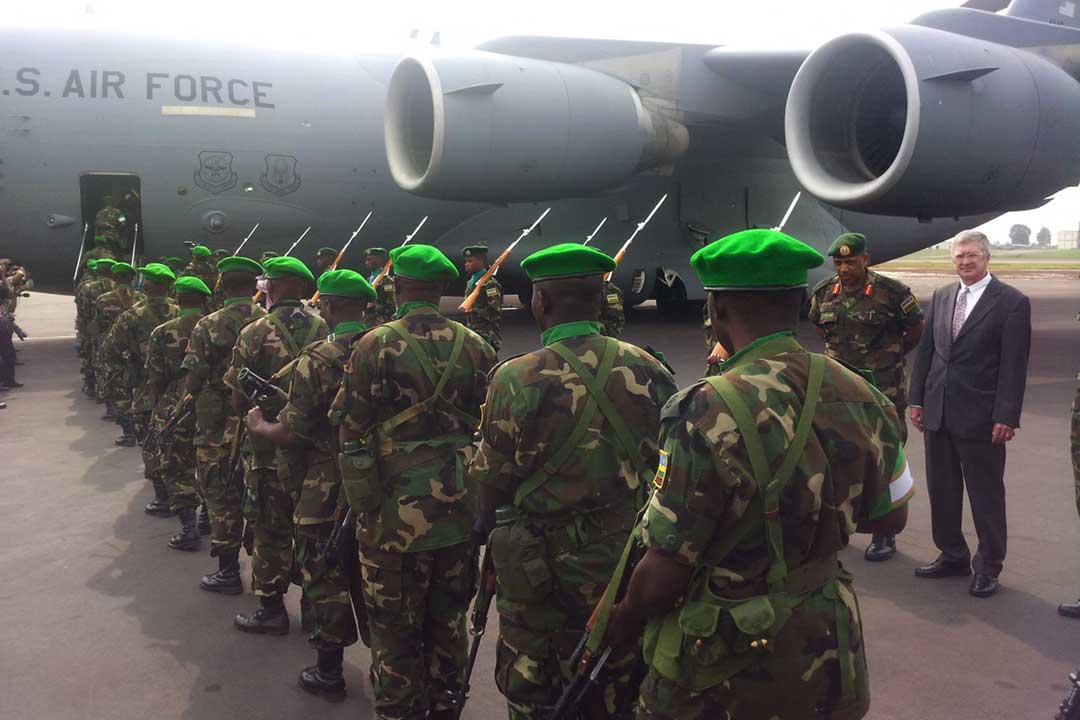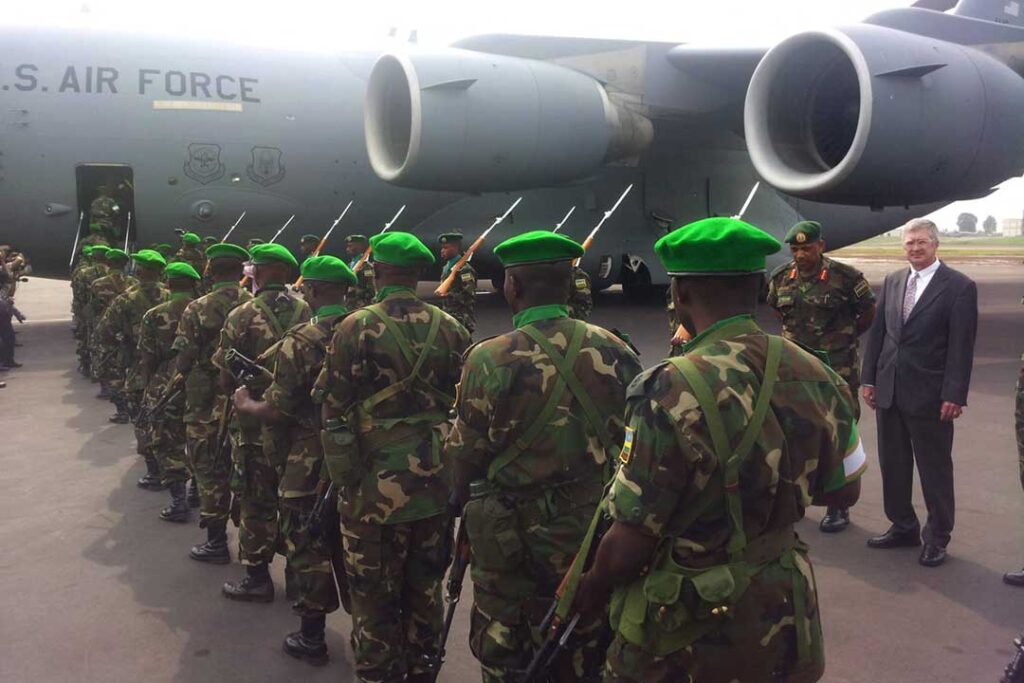Rwanda: the continent’s most admired peacekeeping force
After a four-year civil war and long experience in other conflicts, its troops are trusted and feared

Rwanda, once a byword for peacekeeping disasters after the 1994 genocide, today plays a disproportionate role in regional efforts to prevent conflict and protect civilians. This landlocked nation of just over 11m people is the second-largest supplier of personnel from Africa to UN peacekeeping missions—and the fifth-largest in the world. As of October 2014, the Rwanda Defence Force (RDF) and Rwandan police had 5,092 soldiers, 558 police and 17 military experts serving with UN missions, mainly in the Central African Republic (CAR), South Sudan and Sudan’s Darfur region, second to Ethiopia, according to the UN. Rwandan blue helmets are considered brave, effective and trustworthy, wrote Robert Rehder, a US marine and military observer in Sudan, in a 2008 dissertation for the Marine Corps Command and Staff College in Quantico, Virginia. They have earned “a reputation as a force to be taken seriously”.
US ambassador to the UN, Samantha Power, told the Security Council in July 2014 that the population in countries where Rwandans serve trust them. “Troops from other countries draw strength from their fortitude, and aggressors who would attack civilians fear them,” she added. One of the RDF’s greatest achievements has been to turn a Tutsi rebel movement into a national army with many Hutus serving in its ranks. After the civil war, an estimated 15,000 Hutus from the defeated government army joined the ranks of the new defence force, according to Mr Rehder. These included hardcore rebels such as Paul Rwarakabije, who had commanded the Rwandan Hutu FDLR (Democratic Forces for the Liberation of Rwanda) in Zaire (now the Democratic Republic of Congo, DRC), a remnant of the defeated government army that fled there after many had taken part in the genocide, according to Jason Stearns, author and Congo expert.
Critics of Mr Kagame’s regime argue that Mr Rwarakabije and other senior Hutus were given largely ceremonial jobs and real military power remains with the Tutsi. In January 2014 the US Army transported 850 RDF soldiers to the CAR, where locals noted their honesty and impartiality. “When Rwandan soldiers were guarding their convoys, they took the job seriously,” said a truck driver in CAR to Voice of America on July 31st 2014. “They would stay with any trucks that broke down instead of abandoning them, as other peacekeepers had.” What accounts for the Rwandan peacekeepers’ superior performance? RDF spokesman, Brigadier-General Joseph Nzabamwita, attributes it partly to the extensive mission-specific training, sometimes lasting several months. The lengthy debriefing of returning peacekeepers helps keep that training relevant, he added.
Brigadier-General Nzabamwita also credits the Africa Contingency Operations Training and Assistance (ACOTA) initiative, a US-run programme that helps train African troops in peacekeeping and small unit operations in 25 African countries. Culture and history, however, are two elements that set Rwandan soldiers apart, “an ethos developed by an ancient warrior tradition and honed by years of struggle”, according to Mr Rehder. Rwanda was an expansionist kingdom ruled by ethnic Tutsis since the 15th century. Its subjects all spoke the same language and to a large extent shared the same culture. Despite the Hutu majority, the Tutsi were militarily dominant, according to historian and author Gérard Prunier. Young Tutsis were inculcated with a martial culture in which, as the Kinyarwandan saying goes, “if you are not willing to shed your blood for your country, the dogs will have it for free.” By formalising ethnic identity in bureaucratic documents and ruling largely through a proxy Tutsi elite, the Belgian colonists deepened that divide.
When they entrusted the country’s security to an almost exclusively Hutu armed force, the Belgians set Rwandans on a path to genocide. Today’s RDF grew out of the Rwandan Patriotic Front (RPF), a largely Tutsi army of exiles living in Uganda who had fled there in the early years after independence in 1962. Many had fought in Uganda’s civil wars since the 1970s. Its leader, Paul Kagame, rose to control Uganda’s military intelligence. The RDF’s cadres today have almost unparalleled military experience. Many fought in the four-year Rwandan civil war, which culminated in the 1994 genocide. Others have spent more than seven years fighting in two wars in what is now the DRC from 1996-97 and 1998-2003. Another reason behind the current RDF success may be the high level of education achieved by many of its troops while in Uganda, Mr Rehder explained. Many of the RPF’s fighters were recruited from a relatively successful diaspora and up to 20% of them may have had university education, he estimated. This was probably the best-educated guerrilla movement in Africa’s history, according to Mr Prunier.
While their classroom learning may not have been directly relevant, their mental acuity showed through in small-unit fighting, which requires soldiers to act on their own initiative. Another factor in the RDF’s success is that officers routinely serve on the frontline with their men and are subject to the same discipline, emphasised a Rwandan police officer who has served on several peacekeeping missions and preferred to remain anonymous. The absence of corruption scandals in Rwanda is another likely reason for its army’s success. Soldiers are more likely to remain motivated if their commanders are honest and not siphoning off resources meant for the rank and file, as in Nigeria, the DRC and other African states. One cautionary note: Western donors may be less willing to finance the Rwandan army if the plans for an East African Standby Force (EASF) mean that RDF troops would be deployed in neighbouring countries, such as Burundi or even the DRC. While Rwandan troops participated in the EASF training exercises in Ethiopia in November 2014, they have not been deployed on active operations.
Several rebel movements in the DRC, including the Rwandan FDLR and the Allied Democratic Forces, originally a Ugandan rebel group, are among the dissident movements that the EASF might seek to counter, said General James Kabarebe, Rwanda’s defence minister, in a July 2014 speech. If General Kabarebe meant they could be countered without intervening in the DRC, no one could take exception. But after Rwanda’s military interventions in its neighbour from 1996-2003, and its support for rebel movements in eastern Congo, including the now defeated M23 rebel group, Britain, the US and other countries suspended aid to Rwanda in 2012. Donors may again threaten to cut off funds if Rwanda or its troops meddle in its neighbours’ affairs.



